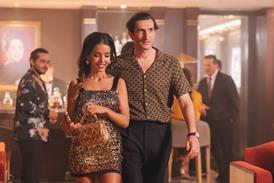Dir: Claude Miller. France. 2003. 104mins
Better forget all about Chekhov before you go to see this. Though a free adaptation of The Seagull, one more among so many, Claude Miller's film has none of the subtle, sensitive intelligence of the great Russian playwright. Instead, it is a clever but blunt version of the play - Miller's opinion of how Chekhov's characters would look and act in the contemporary setting chosen for the plot. Looking very much like a personal reflection of a film-maker reviewing his past dreams and the present state of his career, the script, which follows the play closely enough up until the fourth act, has numerous references to the film business in general and French cinema in particular. This Cannes competition entry should please Miller's faithful followers, and the stellar cast will doubtless support it for local box-office performance - but this may not be enough to carry it across the borders.
Visually lavish, shot mostly on the gorgeous Iles aux Moines, Miller's film observes a set of characters on a summer vacation and reunites them four years later in the city. The opening sequence, showing Lili (Sagnier) slipping out of her summer dress, remaining in the nude and proceeding to have passionate sex with her boyfriend, Julien (Stevenin), should easily make Chekhov turn in his grave.
Then the dramatic patterns of the play take over with the introduction of the various characters - Julien's mother, Mado (Garcia), a famous, but no longer young, movie star visiting her country residence with her lover Brice (Giraudeau), a fashionable movie director. And there is Julien's uncle, Simon (Marielle), once a bon vivant, having troubles with the pastoral surroundings or with his own age (70). The country doctor (Jacques) has nosebleeds every time he is excited and evidently courts every woman in the district, while the caretaker's daughter Jeanne-Marie (Depardieu) is not-so-very-secretly in love with Julien.
There is very little love lost between all these characters, each one an extreme egotist, and the tensions between them come out in angry flashes exploding at the slightest excuse. The first major outburst erupts when Julien, an aspiring film director who fears and despises anyone older than himself, screens his first short in front of the others. He suspects that they do not respond to his brand of poetical experiment, so stops the screening in the middle and lashes out at his mother and her lover, who represent in his eyes traitors who have sold out for large salaries and celebrity.
All the confrontations that follow resound with the typical angry retorts and insults exchanged between the various generations of film-makers through the ages. On one side, the younger set believes that the first step in order to prevail is to make room at the top by kicking out the old fogies, though in the long run, they are bound to become just like them. On the other side, the established talents defend their conventionality by bringing up practical considerations that are, of course, an anathema to the inflamed spirit of youth. Lili, pining for a film career, does not fail to notice that Brice's side could benefit her more at this stage than Julien, and so changes horses in mid-race.
If that sounds like a coarse description for a Chekhov play, rest assured it is a pretty faithful one of Miller's script. The last part takes place in town, as Julien is about to shoot his own version of the summer holiday with most of the characters playing themselves on the movie set.
Miller himself must have been conscious of the problems he was facing, using The Seagull in his attempt to confront an earlier version of himself, represented by Julien, with his present self, Brice. Indeed, the most astute criticism of the film is contained at several points in its own dialogue, whether it is when Mado blames Julien for his excessive pretentiousness, when Julien takes Brice's film to task for being nothing more than a bureaucratic exercise intended to provide work for high-priced actors, or when Brice concedes that often, the best characters in a film are the supporting ones. It is certainly the case in this film.
Ludivine Sagnier lacks the depth and the mystery that would make Lili an interesting character, more than a teenager on the make for a spot in the movies. Garcia works hard at her part - always a weakness to notice that on camera - while Giraudeau never really gets to grips with his role. Julie Depardieu does much better as the patient girl in the shadows, but most of the scenes are finally stolen by two veterans, Jean-Pierre Marielle joined at the end by Michel Piccoli, both blessed with the kind of screen presence that dwarfs anyone standing next to them. They are really and truly Chekhovian, which makes it all the more difficult to forget the source.
Prod co: Les Films de la Boissiere
Int'l sales: Flach Pyramide
Prod: Annie Miller
Co-prod: Alain Sarde
Scr: Claude Miller, Julien Boivent
Cinematography: Gerard de Battista
Ed: Veronique Lange
Prod des: Jean-Pierre Kohut Svelko
Costumes: Jacqueline Bouchard
Sound: Claude La Haye
Main cast: Ludivine Sagnier, Nicole Garcia, Robinson Stevenin, Bernard Giraudeau, Jean-Pierre Marielle, Julie Depardieu, Anne le Ny, Yves Jacques, Marc Betton, with the participation of Michel Piccoli

















No comments yet